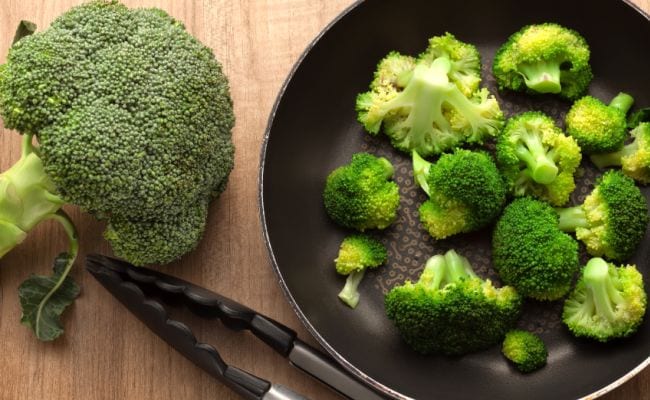
Photo Credit: Istock
- Soy foods & broccoli may reduce side effects of cancer treatment
- Isoflavones and glucosinolates in such foods are known to help
- The study was published in the Breast Cancer Research and Treatment
Did our AI summary help?
Let us know.
A new study, conducted by researchers from Georgetown University, shows that consuming foods such as soy milk and tofu and cruciferous vegetables such as cabbages, kale and broccoli may help reduce common side effects of treatment in breast cancer survivors. The study was published in the Journal Breast Cancer Research and Treatment.
Treatments designed to prevent breast cancer recurrence often inhibit the body's production or use of oestrogen - the hormone that can fuel breast cancer growth. As a result, such patients often experience hot flushes and night sweats, among other side effects that are also commonly experienced post menopause. These findings showed that intake of cruciferous vegetables and soy foods were associated with fewer reports of menopausal symptoms.
The study shows that higher soy intake was also associated with less reported fatigue. Researchers have found that phytochemicals, or bioactive food components, such as isoflavones in soy foods and glucosinolates in cruciferous vegetables may be the source of the benefit.
The team explains that while isoflavones bind to oestrogen receptors and exert weak oestrogenic effects, glucosinolates in cruciferous vegetables influence levels of metabolizing enzymes that can modulate inflammation and levels of oestrogen, possibly attenuating treatment-related symptoms.
"The study addresses an important gap in research on the possible role of lifestyle factors, such as dietary habits, in relation to side effects of treatments. Understanding the role of lifestyle factors is important because diet can serve as a modifiable target for possibly reducing symptoms among breast cancer survivors," shared lead author Sarah Oppeneer Nomura from the University's Georgetown Lombardi Comprehensive Cancer Center.
For the study, the team included 173 non-Hispanic white and 192 Chinese Americans. It was noted that women who consumed more soy foods also showed suggestive associations with other reduced symptoms such as joint problems, hair thinning and memory but these associations did not reach statistical significance.
Therefore, the team concluded that more research is required to confirm these findings and warn that breast cancer patients should not start eating soy suddenly if they haven't tried it before.
Inputs from IANS
Treatments designed to prevent breast cancer recurrence often inhibit the body's production or use of oestrogen - the hormone that can fuel breast cancer growth. As a result, such patients often experience hot flushes and night sweats, among other side effects that are also commonly experienced post menopause. These findings showed that intake of cruciferous vegetables and soy foods were associated with fewer reports of menopausal symptoms.
The study shows that higher soy intake was also associated with less reported fatigue. Researchers have found that phytochemicals, or bioactive food components, such as isoflavones in soy foods and glucosinolates in cruciferous vegetables may be the source of the benefit.
The team explains that while isoflavones bind to oestrogen receptors and exert weak oestrogenic effects, glucosinolates in cruciferous vegetables influence levels of metabolizing enzymes that can modulate inflammation and levels of oestrogen, possibly attenuating treatment-related symptoms.
"The study addresses an important gap in research on the possible role of lifestyle factors, such as dietary habits, in relation to side effects of treatments. Understanding the role of lifestyle factors is important because diet can serve as a modifiable target for possibly reducing symptoms among breast cancer survivors," shared lead author Sarah Oppeneer Nomura from the University's Georgetown Lombardi Comprehensive Cancer Center.
For the study, the team included 173 non-Hispanic white and 192 Chinese Americans. It was noted that women who consumed more soy foods also showed suggestive associations with other reduced symptoms such as joint problems, hair thinning and memory but these associations did not reach statistical significance.
Therefore, the team concluded that more research is required to confirm these findings and warn that breast cancer patients should not start eating soy suddenly if they haven't tried it before.
Inputs from IANS
Track Latest News Live on NDTV.com and get news updates from India and around the world

